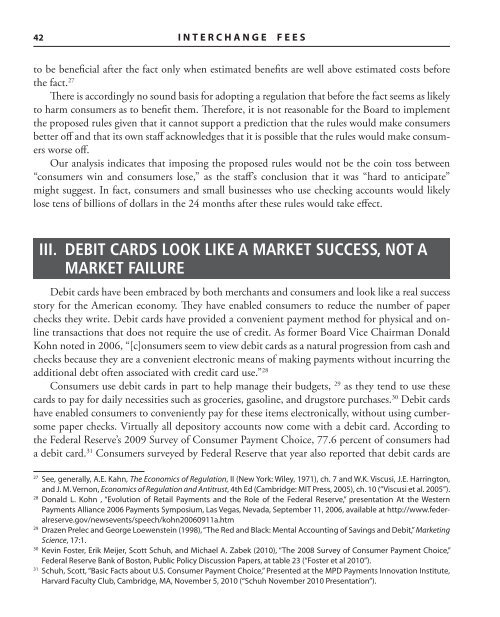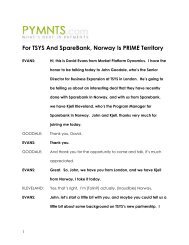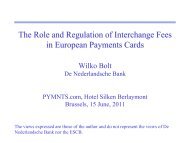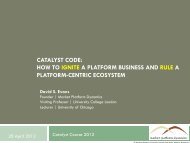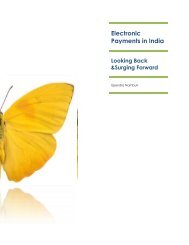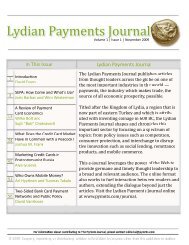42 INTERCHANGE FEESto be beneficial after the fact only when estimated benefits are well above estimated costs beforethe fact. 27<strong>The</strong>re is accordingly no sound basis for adopting a regulation that before the fact seems as likelyto harm consumers as to benefit them. <strong>The</strong>refore, it is not reasonable for the Board to implementthe proposed rules given that it cannot support a prediction that the rules would make consumersbetter <strong>of</strong>f <strong>and</strong> that its own staff acknowledges that it is possible that the rules would make consumersworse <strong>of</strong>f.Our analysis indicates that imposing the proposed rules would not be the coin toss between“consumers win <strong>and</strong> consumers lose,” as the staff’s conclusion that it was “hard to anticipate”might suggest. In fact, consumers <strong>and</strong> small businesses who use checking accounts would likelylose tens <strong>of</strong> billions <strong>of</strong> dollars in the 24 months after these rules would take effect.III. DEBIT CARDS LOOK LIKE A MARKET SUCCESS, NOT AMARKET FAILUREDebit cards have been embraced by both merchants <strong>and</strong> consumers <strong>and</strong> look like a real successstory for the American economy. <strong>The</strong>y have enabled consumers to reduce the number <strong>of</strong> paperchecks they write. Debit cards have provided a convenient payment method for physical <strong>and</strong> onlinetransactions that does not require the use <strong>of</strong> credit. As former Board Vice Chairman DonaldKohn noted in 2006, “[c]onsumers seem to view debit cards as a natural progression from cash <strong>and</strong>checks because they are a convenient electronic means <strong>of</strong> making payments without incurring theadditional debt <strong>of</strong>ten associated with credit card use.” 28Consumers use debit cards in part to help manage their budgets, 29 as they tend to use thesecards to pay for daily necessities such as groceries, gasoline, <strong>and</strong> drugstore purchases. 30 Debit cardshave enabled consumers to conveniently pay for these items electronically, without using cumbersomepaper checks. Virtually all depository accounts now come with a debit card. According tothe Federal Reserve’s 2009 Survey <strong>of</strong> Consumer Payment Choice, 77.6 percent <strong>of</strong> consumers hada debit card. 31 Consumers surveyed by Federal Reserve that year also reported that debit cards are27See, generally, A.E. Kahn, <strong>The</strong> <strong>Economics</strong> <strong>of</strong> Regulation, II (New York: Wiley, 1971), ch. 7 <strong>and</strong> W.K. Viscusi, J.E. Harrington,<strong>and</strong> J. M. Vernon, <strong>Economics</strong> <strong>of</strong> Regulation <strong>and</strong> Antitrust, 4th Ed (Cambridge: MIT Press, 2005), ch. 10 (“Viscusi et al. 2005”).28Donald L. Kohn , “Evolution <strong>of</strong> Retail Payments <strong>and</strong> the Role <strong>of</strong> the Federal Reserve,” presentation At the WesternPayments Alliance 2006 Payments Symposium, Las Vegas, Nevada, September 11, 2006, available at http://www.federalreserve.gov/newsevents/speech/kohn20060911a.htm29Drazen Prelec <strong>and</strong> George Loewenstein (1998), “<strong>The</strong> Red <strong>and</strong> Black: Mental Accounting <strong>of</strong> Savings <strong>and</strong> Debit,” MarketingScience, 17:1.30Kevin Foster, Erik Meijer, Scott Schuh, <strong>and</strong> Michael A. Zabek (2010), “<strong>The</strong> 2008 Survey <strong>of</strong> Consumer Payment Choice,”Federal Reserve Bank <strong>of</strong> Boston, Public Policy Discussion Papers, at table 23 (“Foster et al 2010”).31Schuh, Scott, “Basic Facts about U.S. Consumer Payment Choice,” Presented at the MPD Payments Innovation Institute,Harvard Faculty Club, Cambridge, MA, November 5, 2010 (“Schuh November 2010 Presentation”).
<strong>The</strong> Economic Principles for Establishing Reasonable Regulation 43more widely accepted than checks by merchants. 32 As indicated previously, in 2009, consumersmade 36.6 billion debit card transactions, with a total value <strong>of</strong> $1.421 trillion.Merchants have also embraced debit cards. Many merchants have installed PIN pads so thatconsumers who wanted to pay with their PIN codes could do so. According to the acquirers whoresponded to the Board’s survey conducted in late 2010, 22 percent <strong>of</strong> merchant locations areable to accept PIN debit transactions <strong>and</strong> it is our underst<strong>and</strong>ing from knowledgeable sourcesin the industry that these account for about 80 percent <strong>of</strong> volume. 33 Since May 2003, retailershave been able to choose whether or not they wanted to take signature debit cards in addition tocredit cards. 34 It is our underst<strong>and</strong>ing from conversations with knowledgeable industry observersthat virtually no merchants accepting credit cards have decided to forgo debit cards. Becausefewer people are pulling out their checkbooks to pay, checkout lines move faster for everyone.Competition authorities, courts, <strong>and</strong> economists <strong>of</strong>ten look at output, prices, innovation, <strong>and</strong>quality <strong>of</strong> service to assess how well a market is working. 35 On all these metrics it appears that thedebit card business has performed well. 36Debit card output has increased dramatically. <strong>The</strong> number <strong>of</strong> transactions on debit cardsgrew at an average rate <strong>of</strong> 17.8 percent per year between 2000 <strong>and</strong> 2009, while the dollar value <strong>of</strong>transactions increased at an average annual rate <strong>of</strong> 18.4 percent during that decade. <strong>The</strong> fraction <strong>of</strong>households that use a debit card increased from 17.6 percent in 1995 to 67 percent in 2007 basedon the Board’s Survey <strong>of</strong> Consumer Finance. 37 More recently, the Survey <strong>of</strong> Consumer PaymentChoice conducted by the Federal Reserve Bank <strong>of</strong> Boston found that 77.6 percent <strong>of</strong> consumershad debit cards in 2009. 38Debit card prices have fallen for consumers. At the beginning <strong>of</strong> the 2000s many bankscharged consumers fees for using their debit cards. By the end <strong>of</strong> the 2000s few consumers paidfor using their debit cards, <strong>and</strong> about two-thirds <strong>of</strong> debit cards came with rewards that providedconsumers with value for using their cards. 39Debit card features <strong>and</strong> services have exp<strong>and</strong>ed for consumers. Introduced to most US consumersin the mid-1990s, debit cards began to acquire a range <strong>of</strong> value-added services beginning32Foster et al 2010, at table 27.33<strong>The</strong> Proposed Rules, at p. 81725.34Prior to that date MasterCard <strong>and</strong> Visa required merchants that entered into contract to accept their cards to honorall cards that consumers presented with their br<strong>and</strong>s on them regardless <strong>of</strong> whether they were debit or credit cards.Wal-Mart <strong>and</strong> other merchants wanted to be able to take credit cards but not signature debit cards. <strong>The</strong> card networksagreed to this as part <strong>of</strong> a settlement <strong>of</strong> the lawsuit.35We are not suggesting that any <strong>of</strong> these metrics provides definitive evidence about whether there is or is not a marketfailure <strong>of</strong> some sort. <strong>The</strong>y are <strong>of</strong>ten used, however, as indicators <strong>of</strong> market performance along with other metrics.36In addition published signature debit card interchange rates for merchants have been roughly constant since mid-2004<strong>and</strong> for most networks published PIN debit card interchange fee rates have changed much since mid 2005. See <strong>The</strong> FedEconomists (2009), at figure 3.37Loretta J. Mester (2009), “Changes in the Use <strong>of</strong> Electronic Means <strong>of</strong> Payment: 1995-2007,” Business Review, pp. 29-37.38Schuh November 2010 Presentation.39“2009 Debit Card Rewards – Consumer Insights,” Consumer Loyalty Study , First Data, April 2009.
- Page 3 and 4: Interchange FeesThe Economics and R
- Page 8 and 9: vi INTERCHANGE FEESaround the world
- Page 10 and 11: 2 INTERCHANGE FEESI. INTRODUCTIONIn
- Page 12 and 13: 4 INTERCHANGE FEESin the United Kin
- Page 14 and 15: 6 INTERCHANGE FEESwe believe are ro
- Page 16 and 17: 8 INTERCHANGE FEESpricing in which
- Page 18 and 19: 10 INTERCHANGE FEESmaximizing price
- Page 20 and 21: 12 INTERCHANGE FEESmerchants or wit
- Page 22 and 23: 14 INTERCHANGE FEESrelative to the
- Page 24: 16 INTERCHANGE FEESneed to balance
- Page 28 and 29: 20 INTERCHANGE FEESThe existing lit
- Page 30 and 31: 22 INTERCHANGE FEESE. ImplicationsT
- Page 32 and 33: 24 INTERCHANGE FEESstructure that i
- Page 34 and 35: 26 INTERCHANGE FEESvalidity. There
- Page 36: 28 INTERCHANGE FEEScards has not ch
- Page 39 and 40: The Economics of Interchange Fees a
- Page 41: The Economics of Interchange Fees a
- Page 44 and 45: 36 INTERCHANGE FEES• did not ensu
- Page 46 and 47: 38 INTERCHANGE FEESstriking that wh
- Page 48 and 49: 40 INTERCHANGE FEEScompleted. Witho
- Page 52 and 53: 44 INTERCHANGE FEESin the 2000s. Mu
- Page 54 and 55: 46 INTERCHANGE FEESStaff economist
- Page 56 and 57: 48 INTERCHANGE FEESprices that are
- Page 58: 50 INTERCHANGE FEESwelfare, to set
- Page 61 and 62: The Economic Principles for Establi
- Page 63 and 64: The Economic Principles for Establi
- Page 65 and 66: chapter 3THE EFFECT OF REGULATORYIN
- Page 67 and 68: interchange Fee Capping in Australi
- Page 69 and 70: interchange Fee Capping in Australi
- Page 71 and 72: interchange Fee Capping in Australi
- Page 73 and 74: interchange Fee Capping in Australi
- Page 75 and 76: interchange Fee Capping in Australi
- Page 77 and 78: interchange Fee Capping in Australi
- Page 79 and 80: interchange Fee Capping in Australi
- Page 82 and 83: 74 INTERCHANGE FEESTABLE 4:Annual g
- Page 84 and 85: 76 INTERCHANGE FEESWe describe the
- Page 86 and 87: 78 INTERCHANGE FEESFIGURE 3:Share o
- Page 88 and 89: 80 INTERCHANGE FEESreduction in car
- Page 90 and 91: 82 INTERCHANGE FEESMore specificall
- Page 92 and 93: 84 INTERCHANGE FEESThe RBA also rep
- Page 94 and 95: chapter 4ECONOMIC ANALYSIS OF THEEF
- Page 96 and 97: 88 INTERCHANGE FEESAccording to our
- Page 98 and 99: 90 INTERCHANGE FEESII. BACKGROUNDTh
- Page 100 and 101:
92 INTERCHANGE FEESUnder the propos
- Page 102 and 103:
94 INTERCHANGE FEESThey also provid
- Page 104 and 105:
96 INTERCHANGE FEESThe decision by
- Page 106 and 107:
98 INTERCHANGE FEESTable 4:Comparis
- Page 108 and 109:
100 INTERCHANGE FEEScard transactio
- Page 110 and 111:
102 INTERCHANGE FEESequal, by betwe
- Page 112 and 113:
104 INTERCHANGE FEESTABLE 6: HHI Me
- Page 114 and 115:
106 INTERCHANGE FEESTABLE 7:Checkin
- Page 116 and 117:
108 INTERCHANGE FEES• Online bank
- Page 118 and 119:
110 INTERCHANGE FEESCash back at th
- Page 120 and 121:
112 INTERCHANGE FEESofferings for a
- Page 122 and 123:
114 INTERCHANGE FEESbanks and credi
- Page 124 and 125:
116 INTERCHANGE FEEStransactions we
- Page 126:
118 INTERCHANGE FEESA 1995 study by
- Page 129 and 130:
Economic Analysis of Federal Reserv
- Page 131 and 132:
Economic Analysis of Federal Reserv
- Page 133 and 134:
Economic Analysis of Federal Reserv
- Page 135 and 136:
Economic Analysis of Federal Reserv
- Page 137 and 138:
Economic Analysis of Federal Reserv
- Page 139 and 140:
chapter 5HOW CHANGES IN PAYMENT CAR
- Page 141 and 142:
Economic Analysis of Interchange Fe
- Page 143 and 144:
Economic Analysis of Interchange Fe
- Page 145 and 146:
Economic Analysis of Interchange Fe
- Page 147 and 148:
Economic Analysis of Interchange Fe
- Page 149 and 150:
Economic Analysis of Interchange Fe
- Page 151 and 152:
Economic Analysis of Interchange Fe
- Page 153 and 154:
Economic Analysis of Interchange Fe
- Page 155 and 156:
Economic Analysis of Interchange Fe
- Page 157 and 158:
Economic Analysis of Interchange Fe
- Page 160 and 161:
152 INTERCHANGE FEESleads to an off
- Page 162 and 163:
154 INTERCHANGE FEESacquirers would
- Page 164 and 165:
156 INTERCHANGE FEESBased on this a
- Page 166 and 167:
158 INTERCHANGE FEESTable 2:Annual
- Page 169 and 170:
Economic Analysis of Interchange Fe
- Page 171 and 172:
Economic Analysis of Interchange Fe
- Page 173 and 174:
Payments Innovation and Interchange
- Page 175:
Payments Innovation and Interchange
- Page 178 and 179:
170 INTERCHANGE FEEScredit cards. T
- Page 180 and 181:
172 INTERCHANGE FEESGenerally there
- Page 182 and 183:
174 INTERCHANGE FEESThe merchant-pa
- Page 184 and 185:
176 INTERCHANGE FEESmand conditiona
- Page 186 and 187:
178 INTERCHANGE FEESis determined b
- Page 188 and 189:
180 INTERCHANGE FEESnumbers of merc
- Page 190 and 191:
182 INTERCHANGE FEESfor example—t
- Page 192 and 193:
184 INTERCHANGE FEESV. CONCLUSIONCo
- Page 194 and 195:
186 INTERCHANGE FEESI. INTRODUCTION
- Page 196 and 197:
188 INTERCHANGE FEES• It is not t
- Page 198 and 199:
190 INTERCHANGE FEESin May 2009. 17
- Page 200 and 201:
192 INTERCHANGE FEESthere is only o
- Page 202 and 203:
194 INTERCHANGE FEES• It is uncle
- Page 204 and 205:
196 INTERCHANGE FEESPIN debit inter
- Page 206 and 207:
198 INTERCHANGE FEESas a method of
- Page 208 and 209:
200 INTERCHANGE FEESThe debit cards
- Page 210 and 211:
202 INTERCHANGE FEESTable 2:BankRBC
- Page 212 and 213:
204 INTERCHANGE FEESkind of highly
- Page 215 and 216:
CONTRIBUTORSHoward ChangPrincipal w
- Page 217 and 218:
BIBLIOGRAPHYAckerberg, Daniel A., a
- Page 219 and 220:
Bibliography 211Chakravorti, Sujit
- Page 221 and 222:
Bibliography 213Gans, Joshua S., an
- Page 223 and 224:
Bibliography 215Katz, Michael L., a
- Page 225 and 226:
Bibliography 217Rochet, Jean-Charle
- Page 228:
Interchange FeesThe Economics and R


